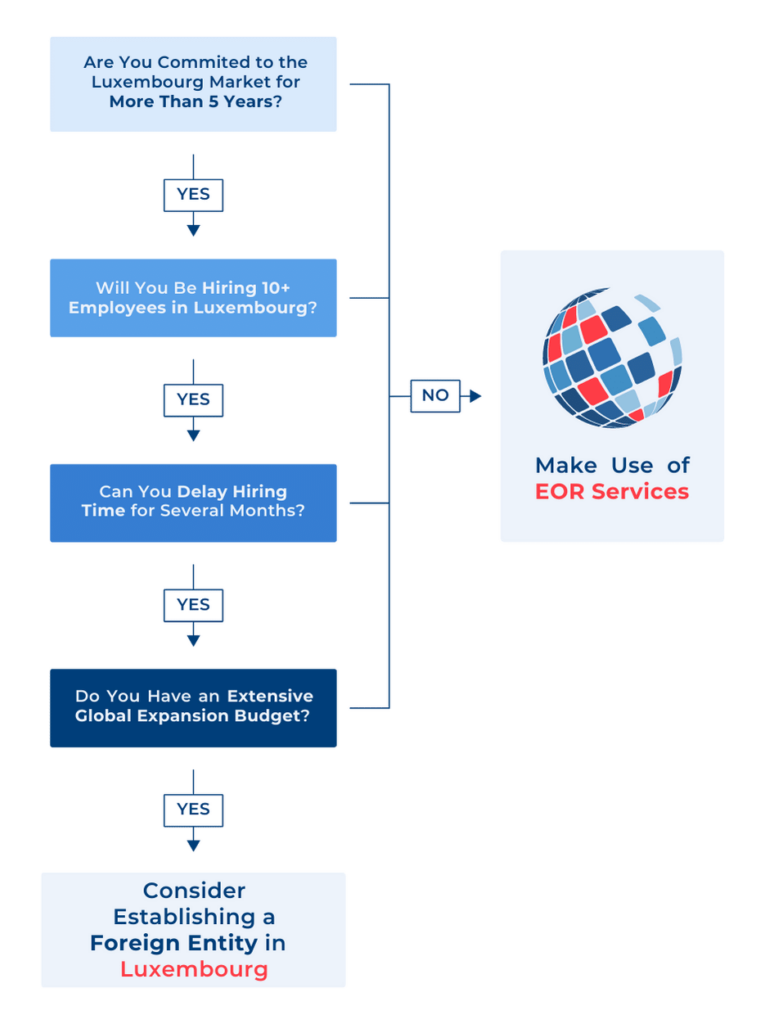Employer of Record (EOR) in Luxembourg
Hire Globally, Pay Locally, Expand Effortlessly
An Employer of Record (EOR) provides an efficient pathway for hiring and managing employees overseas without establishing a local branch. INS Global’s EOR service in Luxembourg offers companies a rapid, secure solution for international talent acquisition.
As a third-party organization, our EOR handles complex employer responsibilities, enabling businesses to streamline global mobility in just 48 hours. Companies can now navigate overseas hiring and employee management with unprecedented ease and cost-effectiveness.
Accelerate Your Global Expansion Strategy
Luxembourg stands out as one of Europe’s most dynamic business environments, offering a gateway to both European and international markets. Expanding into Luxembourg through an Employer of Record (EOR) ensures businesses can access top-tier talent without getting entangled in the complexities of company incorporation. With the right support structure, companies can seize market opportunities faster and operate with full legal compliance from day one.
Operate Quickly and Responsibly
Traditional company setup in Luxembourg can involve months of paperwork, negotiations, and legal hurdles. An EOR offers a practical alternative, enabling companies to legally hire employees within days. This streamlined approach eliminates the need for costly overheads and allows businesses to allocate resources directly toward revenue-generating activities rather than administrative setup.
Simplified Talent Acquisition and Management
Finding and onboarding qualified professionals in Luxembourg is essential for long-term success. An EOR provides immediate access to established local networks and recruitment resources, ensuring faster and more accurate hiring decisions. Once onboarded, employees benefit from clear contracts, accurate payroll processing, and local support services — all essential for maintaining high employee satisfaction and retention rates.
Stay Agile in a Competitive Market
Business needs can change rapidly, especially when entering new markets. An EOR provides the flexibility to scale your workforce up or down without the heavy financial and legal commitments that come with opening a branch office. Whether expanding cautiously with a small team or rapidly building a larger local presence, an EOR makes workforce management in Luxembourg straightforward and risk-free.
Maintain Compliance Across All Employment Matters
Luxembourg’s employment regulations are robust, with strict requirements related to working hours, overtime, leave entitlements, and social security contributions. Non-compliance can result in severe penalties and reputational damage. An EOR stays updated on all legislative changes and ensures your company’s employment practices are always in full compliance, safeguarding your operations from unnecessary risks.
Enhance Cost Predictability and Budget Management
Launching operations in a new country often brings hidden expenses — from legal fees to administrative overheads. An EOR solution provides predictable monthly pricing, helping businesses better manage cash flow and budget forecasts. By avoiding the fluctuating costs of company incorporation, businesses can deploy capital more strategically toward growth initiatives.
Streamline Immigration and Mobility Services
Relocating existing employees or hiring international talent in Luxembourg requires navigating the country’s strict immigration and work permit laws. An EOR provides guidance on visa requirements, processes necessary documentation, and ensures that your international employees are authorized to work compliantly. This support accelerates deployment and reduces the risk of legal complications.
Foster a Strong Employer Brand in Luxembourg
Establishing a good reputation as an employer is key to attracting and retaining talent. By ensuring smooth onboarding, legal employment conditions, competitive benefits, and responsive HR support, businesses partnering with an EOR can build positive relationships with their Luxembourg-based employees. A strong employer brand not only boosts retention but also enhances your company’s appeal to future candidates.
Benefit from Local Expertise and Strategic Insights
Successfully operating in Luxembourg requires more than just administrative compliance — it demands a true understanding of the local market, culture, and business practices. An EOR brings valuable local expertise to the table, offering insights into labor market trends, salary expectations, and cultural norms. These insights help businesses make better decisions and avoid costly missteps when expanding into Luxembourg.
Support for Project-Based or Temporary Assignments
Not every international expansion requires a long-term commitment. Many companies seek to establish a presence in Luxembourg for specific projects, pilot programs, or temporary initiatives. An EOR makes it easy to hire employees for fixed-term projects without setting up a permanent entity. Once the project concludes, the EOR can smoothly offboard employees, ensuring full legal compliance and minimal administrative burden.
Access a Multilingual, Highly Skilled Workforce
Luxembourg’s strategic location at the crossroads of Europe has created a highly educated, multilingual workforce fluent in English, French, German, and Luxembourgish. This diverse talent pool is ideal for companies looking to serve broader European markets. An EOR helps businesses tap into this workforce quickly, making it easier to build teams that can support operations across borders.
Reduce Barriers to Entry in Regulated Industries
Sectors like finance, insurance, and healthcare in Luxembourg are heavily regulated. Setting up a company within these industries often requires obtaining specific licenses, fulfilling stringent regulatory requirements, and undergoing lengthy approvals. An EOR provides a way to operate compliantly without directly entering into regulatory frameworks, allowing businesses to test new markets and services before making deeper investments.
Bridge Cultural Differences with Local HR Practices
Understanding local workplace expectations is critical to building a productive team. Luxembourg values professionalism, respect for work-life balance, and clear contractual obligations. By partnering with an EOR, businesses can implement HR practices that align with these cultural expectations, creating a positive working environment and reducing potential friction between employer and employee.
Test New Markets with Minimal Risk
Expanding internationally always carries inherent risks — from market volatility to differences in customer behavior. An EOR offers a “low-commitment” approach to test Luxembourg’s market potential without fully committing to company formation. If the market response is positive, businesses can later choose to establish a more permanent presence; if not, they can exit easily without significant financial loss.
Facilitate Cross-Border Team Collaboration
Luxembourg’s location, nestled between Germany, France, and Belgium, makes it an ideal hub for regional operations. Businesses using an EOR can build teams that collaborate seamlessly across borders, supporting activities in neighboring countries. This geographical advantage is particularly useful for companies planning to expand into multiple European Union markets simultaneously.
Promote Sustainable Growth from the Outset
Building a sustainable, scalable business presence means setting up operations correctly from the beginning. An EOR ensures employment practices, tax contributions, and benefits management are handled properly, avoiding future legal or financial issues. With a strong foundation in place, businesses can focus on long-term planning and investment without distractions caused by early-stage compliance errors.
Employer of Record (EOR) in Luxembourg - Summary
Employer of Record (EOR) in Luxembourg
What are the Advantages of Using a EOR as your Local Partner in Luxembourg?
Expert Guidance on All Legal Matters
EOR provide specialist knowledge of relevant labor regulations to assure you of total compliance
Get Started in a Fraction of the Time
A EOR can allow you to begin operations in a new country in a matter of days, which is ahead of the months it can take to establish a new entity via company incorporation
Simplify Your Setup Process
EOR allow you to operate in a way that gives you greater flexibility in the way you hire and provide for your employees
Reduced Spending on Costly Local Necessities
Save on salary, benefits, and other costs like office space in Luxembourg
Enjoy All the Services You Need Through One Point of Contact
A EOR gives you the operational capabilities of an entire team or department for a single monthly fee, with no additional management time requirements.
What Does a EOR Provide Over Company Incorporation in Luxembourg?
Incorporating a new company overseas can be burdensome and costly. If you are unfamiliar with labor regulations in your target market, you could face expensive fines and penalties for the slightest errors in HR.
A EOR:
- Allows you to expand confidently without fear of costly fees
- Provides expert advice and guidance on local labor benchmarks and best practices
- Increases market entry time
- Decreases the cost of administrative overheads and expenses in Luxembourg

The Steps Required to Begin Working with a EOR in Luxembourg
- We meet to discuss your needs and form an agreement that suits you
- Our EOR in Luxembourg provides you with a way to quickly and securely transfer or hire employees to the country
- We take care of all necessary HR services for you and your employees
- You and your staff continue operations as normal
Labor Law in Luxembourg - 2024 updated
Employment Contracts in Luxembourg
Most contracts in Luxembourg are for indefinite periods and must be made in writing. Fixed-Term contracts may be made for specific short-term periods.
There is a guaranteed minimum wage in Luxembourg, based on age and worker type.
Work Hours and Overtime in Luxembourg
Regular working hours are 8 hours per day and 40 hours per week. Any amounts above this must be established in writing with a specific reason given and can only be for a short time.
Maximum working hours, including overtime, must not exceed 10 hours per day or 48 hours per week. These overtime hours are to be paid at 140% of the standard salary.
Holidays and Annual Leave in Luxembourg
There are 11 days of public holiday per year in Luxembourg. Employers must allow workers a day off on these holidays or pay 200% of their standard salary. The legal minimum amount of annual leave a worker is entitled to in Luxembourg is 25 days.
Sick Leave in Luxembourg
Workers in Luxembourg must provide employers with a medical incapacity certificate by the third day if they want to take sick leave and are protected against dismissal for 26 weeks.
Employers are obliged to pay employees on sick leave until the end of the month in which the 77th day of sick leave occurred. After which time, the employee is eligible to receive an allowance based on social security contributions.
Maternity and Paternity Leave in Luxembourg
Female employees are eligible for maternity leave that begins 8 weeks before the due date of a child and lasts a maximum of 20 weeks (with additional leave for late births). During this time, employees may receive an allowance based on their standard salary but limited to 5X minimum wage.
Male employees are eligible for 10 days of paid paternity leave upon the birth of a child. Parents in Luxembourg may choose to take 4-20 (depending on whether that leave is full-time, part-time, or split between parents) months of parental leave until a child is 6 years old.
During this time, they can receive an allowance based on social security payments.
Tax Law and Social Security Contributions in Luxembourg
Income tax in Luxembourg is leveled progressively from 0-42%. The amount also depends on the marital and residency status of the employee. Employers should expect to contribute to their employee’s social security an amount between 12.15-15.2% of their salary. Employee contributions are between 12.2-12.45%.
CONTACT US TODAY
Discover More Solutions in Luxembourg
FAQs
Expert EOR services are priced in Luxembourg as a percentage of a coworker’s monthly salary. This cost covers all HR duties necessary to guarantee adherence to all regional employment laws.
It is safe, legal, and effective to manage employer duties through an EOR in Luxembourg without the need for a specific organizational structure there. EOR services achieve this by retaining excellent HR support and engaging local legal experts.
Your team members will be totally protected by the law, get accurate and timely monthly payments, and have access to all employee benefits in Luxembourg if you use an EOR service agreement.
Independent contractors working inside a Luxembourg EOR framework may be qualified for some or all of the same benefits as regular employees while maintaining complete control over their work. This is the same as what contractors in Luxembourg would get if they were working with an umbrella company.
By employing their extensive professional networks, in-depth understanding of local business resources and benchmarks, and a firm dedication to ethical hiring processes, our team of recruiting consultants can locate the best local talent in Luxembourg for your requirements.
As a result, integrating these new recruits into our Luxembourg EOR system will be simpler and more efficient than when they were hired through more traditional hiring practices.
Through INS Global, you receive comprehensive compliance-assured employment outsourcing assistance from a truly international EOR services provider. This follows all applicable national, state, and municipal laws meaning you have access to the whole country.
It’s possible that specific PEO or EOR service providers in Luxembourg have stringent hiring standards or a cap on the number of workers you may hire at once. However, INS Global is aware that depending on your global company plan, you could need to scale up or down quickly. Working with us gives you the flexibility to hire as few or as many individuals as you need to reach your objectives.
Payroll expenses, hiring fees, signing bonuses, and other direct and indirect costs like incentive schemes, handling the taxes of international workers, and social insurance should all be taken into consideration as part of the hiring cost in Luxembourg.
By doing away with the requirement for a local site, using Luxembourg PEO services allows you to circumvent time-sensitive incorporation laws.
Giving your employees a choice to work in a shared workspace or the freedom to do so whenever and wherever it’s most convenient is still a good idea, and INS Global can also provide advice on the best ways to offer this.
Absolutely. We can handle the essential changes, such as visa and work permit procedures if Luxembourg citizens or foreigners are subject to various local employment rules, tax legislation, or employee perks.
For companies of all sizes, from SMEs to multinational corporations, the best EOR and PEO solutions are available to enable the effective and secure employment of foreign or local workers. If more workers are needed, our services can readily scale up to meet that need, and they can even take the place of more complicated internal HR requirements.
Businesses in a variety of industries that either don’t have their own structures in a target country (or desire to avoid cost-scaling issues while focusing on expansion) would benefit greatly from the legal expertise offered by PEO and EOR services.
Two alternative third parties that can be used to directly or indirectly hire independent contractors are staffing companies and umbrella businesses.
The majority of independent contractors in Luxembourg work for themselves or own their own small enterprises. According to Luxembourg law, labor agreements, not employment contracts, must be used when hiring contractors.
Before the job begins, an independent contractor might be required to provide a CV, portfolio, verified references, and a signed NDA.
Employers in Luxembourg typically organize payroll monthly, with deductions for tax and social security contributions made at source.
Monthly minimum wages in Luxembourg differ for skilled and unskilled labor, and both are amended frequently. The current minimum for skilled workers is EUR 3.009,88 per month, while unskilled workers must receive at least EUR 2.508,24.
Citizens of most EU and EFTA states can live and work in Luxembourg without requiring additional paperwork. For citizens of other countries, the most common work visa type is the Salaried Worker Visa. These are available to those who already have a job in Luxembourg and require the employer to handle most of the process. They can take several weeks to arrange, and are available for 1 year at a time, with the option for 3 years’ renewal.
Additionally, workers can apply for a Highly Qualified Worker Visa, also known as an EU Blue Card. These are valid for up to 4 years and allow the holder to live and work across the EU. However, the application requirements remain high.
In Luxembourg, employers retain and manage taxes on behalf of their employees. They are also required to provide contributions to the employees‘ social security funds. These funds cover health insurance, pensions, and other forms of health benefits. The employer contribution amount is equivalent to 12.22-15.75% of the employee‘s salary.
All employees in Luxembourg are eligible for the usual benefits of paid leave, health and medical insurance, a pension, and unemployment insurance. In addition, many employers in Luxembourg provide supplementary benefits, including travel allowances, meal vouchers, and additional paid leave.
Employers in Luxembourg can amend employment contracts with written notification of any changes being provided to the employee if the change will negatively impact the workers‘ conditions. Changes resulting in a positive change may be applied without notice. Some worker types are protected against any negative changes to their contracts without prior agreement.
All employees in Luxembourg are eligible for basic medical treatment through the public healthcare system, called the La Caisse Nationale de Santé/Gesondheetskees – CNS. Users pay around 10-20% for most treatments, with the rest being paid through social insurance funds. Access to further services and specialists requires further payment, for which many employers offer supplementary health insurance packages.
All employees in Luxembourg are eligible for severance pay except in cases of gross misconduct.
Severance and notice in Luxembourg depend on the length of the employee’s service with the company. Notice periods begin at 2 months notice and increase to a maximum of 6 months.
Severance starts with a minimum of 5 years of service, providing 1 month’s standard salary. This amount increases to a maximum of 12 months’ salary after 30 years of service.
The Ministry of Labor and Employment is in charge of overseeing much of the country‘s employment legislation, with the Labor and Mines Inspectorate investigating and various national Labor Courts judging on matters of dispute.
There are 11 public holidays per year on which employees are eligible for paid leave if the day falls on a typical work day. Workers are eligible for an additional day off if the public holiday falls on a Sunday or other rest day.

